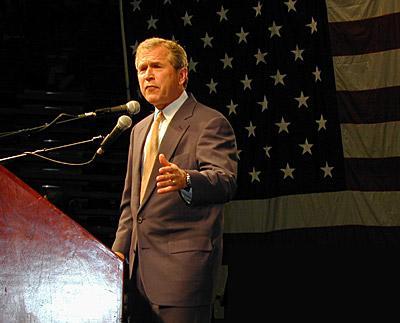Regardless of your politics, I think it is widely believed that George W. Bush has far exceeded the expectations of even his strongest supporters. He began his bid for president as a perceived half-wit, but as Election Day grew nearer, America warmed up to his affable demeanor. And although, at times, it seemed as if he was re-inventing the English language, he somehow made you feel like he was one of us. He wasn’t perfect, but he had an aura such that even those who clamored about his being ill-qualified for the job were comforted that he meant well.
Sept. 11, Afghanistan and Iraq are all moments where, whether you agree with his positions or not, gleaning good intentions is not too difficult. He ran as a man of principle. Recalling the presidential debates, his most admired philosopher was Jesus Christ. He has, for the most part, delivered on his promise of principle, but so did his father, George H. W. Bush. Again, he was a man who rose to the occasion, although somewhat less surprisingly.
The question then becomes: Do the Georges have more in common than their ability to rise to the occasion? In other words, will W suffer the same fate as his father in his bid for re-election?
That question has yet to be answered, but things are not shaping up in George W’s favor as the parallels are eerie. Let us recall, for a moment, his father’s run for re-election. The first President Bush led a coalition into Kuwait, obliterated the Iraqi army and handily won the Gulf War. Following his victory, he approval polled at 89 percent. A mere 16 months later, those numbers plummeted to 32 percent, largely driven by his failure to focus on the domestic economy. Subsequently, he was beaten by 6 million votes and trounced in the Electoral College by a 202 vote margin. The victor: Bill Clinton, the “comeback kid” from Hope, Ark., a relative unknown at the time.
Fast forwarding a decade to the current environment, George W. Bush’s prognosis is not too promising. He, like his father, has approval ratings that exceed average. They are currently 61 percent, but if we go to war with Iraq they are likely to sky-rocket again. If he wins the war as decisively as his father, his numbers will rise accordingly.
As we saw in 1991-1992, numbers are short-lived. Bill Clinton’s victorious campaign quip was “it’s the economy stupid.” George H. W. Bush never understood that, and if the current President Bush doesn’t, he will suffer a similar fate.
According to the Feb. 5 New York Times, the economy has fallen into its worst hiring slump in 20 years. Yes, you read that right, twenty years. In addition, growth rate has slowed to less than 1 percent and business execs see no end in sight.
This does not bode well for the possibility of President Bush’s re-election. He has chosen to consume his administration with the “imminent threat” posed by Iraq rather than the imminent threat of having a restless country willing to give him the boot if he doesn’t do something about the economic situation.
President Bush’s first point of order in his State of the Union was the economy. He made some wonderful rhetorical overtures about reviving it, but then shifted his focus to tax cuts. As nice as tax cuts are, most people don’t see the economy and tax cuts as intimately associated. Tax cuts will not be enough to get W re-elected (and neither will his new deficit-spending budget). We need jobs and we need them now.
George W. Bush has proven that he is not the lackey he was portrayed as at the outset of his campaign. He has risen to the occasion a number of times and he has done so based on his foundation of good intentions. However, in this case good intentions won’t be good enough. If he does not focus more of his energy on the economy and less on his mission of righting the wrongs in the international community, we will find ourselves witness to déjà vu all over again — and a Democratic victor in 2004.
All Over Again
February 10, 2003

All Over Again




